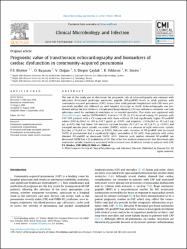Prognostic value of transthoracic echocardiography and biomarkers of cardiac dysfunction in community-acquired pneumonia
Özet
The aim of this study was to determine the prognostic role of echocardiography and compare with admission N-terminal proB-type natriuretic peptide (NT-proBNP) levels in adult patients with community-acquired pneumonia (CAP). Consecutive adult patients hospitalized with CAP were prospectively enrolled and followed-up until hospital discharge or death. Echocardiography was performed within the first 48 hours. Complicated hospitalization (CH) was defined as intensive care unit admission, need for mechanical ventilation or in-hospital mortality. This study was registered with ClinicalTrials.gov, number NCT02441855. A total of 15 CH (13.5%) occurred among 111 patients with CAP. CAP patients with a CH compared with those without CH had significantly higher NT-proBNP values (1267.4 +/- 1146.1 vs. 305.6 +/- 545.7 pg/mL, p < 0.001) and troponin I (23.8 +/- 24.3 vs. 10.3 +/- 6.3 ng/mL, p 0.02) but had lower left ventricle ejection fraction (52.7 +/- 8.7 vs. 60.5 +/- 6.7%, p < 0.001) and tricuspid annular plane systolic excursion (TAPSE), which is a measure of right ventricular systolic function (17.1 +/- 4.4 vs. 21.8 +/- 4 mm; p 0.001). Patients with elevation of NT-proBNP and decreased TAPSE at presentation had a significantly higher probability of CH (60%) than patients with either elevated NT-proBNP or decreased TAPSE (40%). Patients with neither elevated NT-proBNP nor decreased TAPSE had a 0% probability of CH. This is the first study to demonstrate that decreased right ventricular systolic function is associated with increased rates of adverse events in patients with CAP. (C) 2016 European Society of Clinical Microbiology and Infectious Diseases. Published by Elsevier Ltd. All rights reserved.


















